Spanish film
director Fernando Trueba has had a long, fascinating career which
has branched out in many directions. He started out as a movie
critic in the 1970s for the newspaper El Pais. He has since
worked as an author, screenwriter, movie director and producer, book
editor and a musical producer. He has won Grammys for his work as
well as the Goya Award, Silver Bear and an Oscar for his 1994 film
Belle Époque,
which won for Best Foreign Film.
He
was recently nominated for his second Oscar for Chico and Rita,
his animated love song to the jazz scene of the 1940s and
1950s. Trueba created and wrote the film with well known Spanish
artist and designer Javier Mariscal. The two decided that they
wanted to create a far-reaching celebration of Cuban jazz, as shown
as an intimate and troubled love story between a talented pianist
and the singer who is his muse. The film revisits such jazz
hotspots as Havana, New York, Paris and Vegas and spans years to
tell its heartfelt story.
A couple of
days before the Academy Award ceremony, Mr. Trueba gave us a call to
talk about his film, his love of jazz and his Oscar experience.
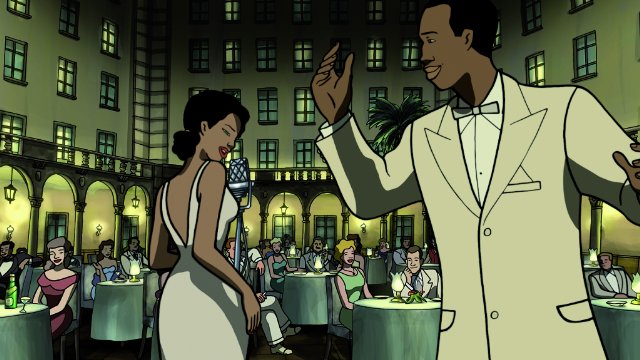 You
and Javier Mariscal have been friends and collaborators for years.
How did the idea of making
Chico & Rita
come about?
You
and Javier Mariscal have been friends and collaborators for years.
How did the idea of making
Chico & Rita
come about?
It’s because
we became such good friends that we wanted to make something
together. I always thought that a movie is like making a treat.
You have to put together a great crew and you go far away to look
for some far island where you think you are going to find a treasure
or something like that. Javier Mariscal and I, we wanted to do some
work together, to share more time, to really collaborate. Chico
& Rita was the way of doing this. We thought about what things
we like the most and the first thing was music. Jazz. Cuban
music. Cuba. It just started like this. From this we started
working on a script, story, characters, etc.
Music has
obviously been just as important to your career as filmmaking has
been. How exciting is it to get the chance to mix your two passions
so completely as you do here?
I’ve done that
before, when I did Calle 54 ten years ago, a documentary on
Latin jazz. As I’m getting older, I always try in my movies to put
the most possible things that I really like and enjoy. I don’t like
to make movies about people that I dislike. I would never make a
movie about Margaret Thatcher. I think that’s horrible, for me it
would be a nightmare to do a movie about a character like this. So,
when I do movies, I try to put in them all the things that I like –
music, love, New York, Havana. Also, Chico & Rita is
[about] my love
of classic American cinema. I think that’s there all the time,
also, the classical narrative ways. So, that’s it…
As a jazz fan,
how much fun was it to recreate such legendary scenes as Havana, New
York, Paris and Vegas in the 40s and 50s?
It was a lot
of fun. One thing that was very exciting was mixing the fictional
character with real characters like Charlie Parker, Dizzy Gillespie
or all the real musicians that we squeezed into the story. That was
a lot of fun. Also, the production of the music of the score of the
movie is part of the script, in some ways, because the story is told
through music, most of the time. That was one of the nicest things
about making Chico & Rita, for me it was a very exciting,
very strong work. Very hard work sometimes, but at the same time, I
would start tomorrow again.
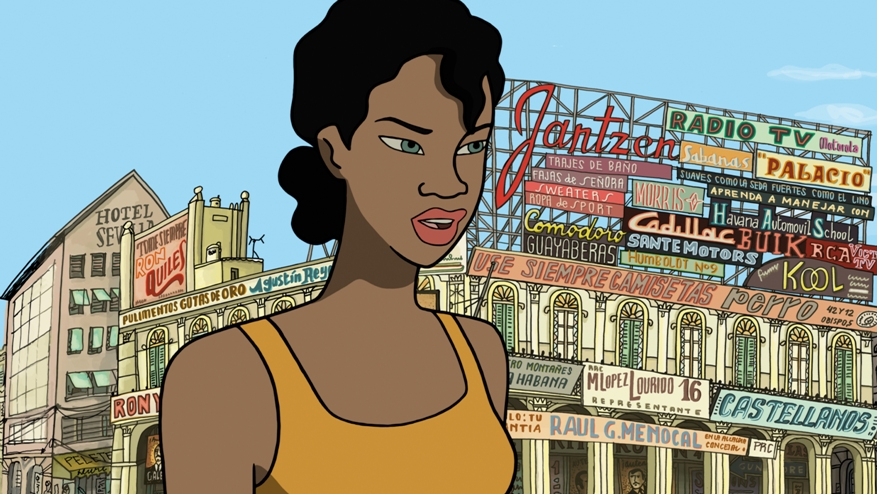 Since
the movie is so much about music, how vital was it to get legendary
Cuban pianist Bebo Valdés involved in the film?
Since
the movie is so much about music, how vital was it to get legendary
Cuban pianist Bebo Valdés involved in the film?
That was an
idea that came to us at the beginning of the movie. When we decided
that we are going to make our love story and that we wanted a lot of
music in it, so let’s do a story about two musicians. She can be a
singer. He can be a musician. Then we said, “What if he’s a
pianist? Then we can have Bebo playing for him.” That was a
crucial moment for the movie, because then, we started to put
everything together from that moment on. It was a great privilege.
Bebo was already very old at that time. He has just retired,
stopped having concerts and performing in public. Chico & Rita
was his last work, his last professional achievement.
It
was a gift for us. It was a privilege. That’s why we dedicated the
movie to him. He’s now 93. He loved the movie. When he saw the
movie finished, it was the only time in my life I saw him crying
with tears like a little boy. For me, it was a moment I will never
forget in my life. He said to me a beautiful thing. I had
never thought that way. He told me, “You know, Fernando, I’m not
going to be here. Because of this movie, people will be still
listening to my music.” I love that he takes the movie this way.
It was a very emotional, strong moment for us.
Were Chico &
Rita based on specific musicians, or were they more loosely based on
lots of different people?
Yeah, we
picked from a lot of different things. When you are writing a
book or writing any fiction work, you pick things from your own
life, from stories that you heard, stories that you’ve read or
stories that you know through someone else. I’ve been in the
musical ambience for many years. I’m friends with lots of musicians
and lots of Cuban people – not only musicians, but also actors and
writers. So you have a whole biblioteca [Spanish for
library] of personal experience. It’s just to choose the right ones
and invent the right ones that you need for the story. It’s always
like that, fiction grows from reality.
I believe that
Chico & Rita
is your first
animated film.
It is.
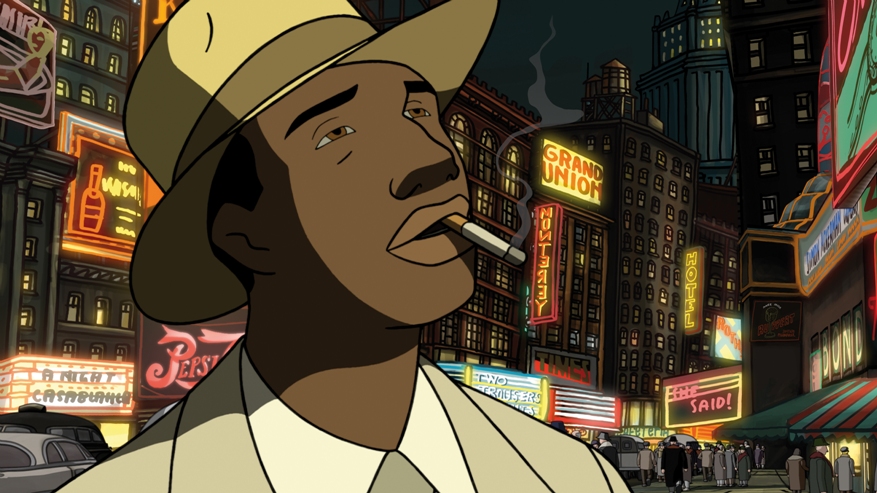 How
was making it different than making a live-action film?
How
was making it different than making a live-action film?
It’s the same,
but it’s completely different. The most important thing is that you
need to have the whole movie shot by shot in your head before
actually making it. That’s a big thing. That makes a really,
really big difference. When you do live action movies, you have to
think out a lot of things before, but you can let many, many things
happen in the process. Say, for the actors, there is some room for
improvisations from the moment of inspiration. But here, you need
all this inspiration before the movie gets done. (chuckles)
Even though
the film is animated, you did spend some time in Havana filming.
What was that experience like and how did it add to the feel of the
film?
We work a lot
with Cuban actors and Cuban musicians and also doing research,
photographs, everything to prepare the movie. So, we did a lot of
work there before.
Animated films
tend to be aimed towards children. Why do you think that the art
form is not used more often for adult stories like
Chico & Rita?
This is a
process that started in the comic medium with graphic novels. When
Art Spiegelman won the Pulitzer Prize for his book Maus, he
demonstrated to the world that comics can be adult, not just
superficial entertainment for children or for childish adults. He
and people like Robert Crumb and some other artists demonstrate that
was a medium that can tell complex stories. I think that after
graphic novels, now is the time for animation movies. That’s why a
movie like Chico & Rita [can be made] or other movies like
Waking Life [by Richard Linklater] or Persepolis [by
Marjane Satrapi] or Waltz with Bashir [by Ari Folman] and
now… the other day we were in New York for the opening of Chico &
Rita and we were with Jonathan Demme and he’s working on Zeitoun,
David Eggers’ book, to make it into animation. So I think animation
is growing.
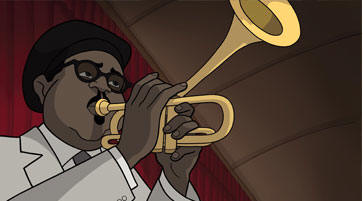 One
of the great things about
Chico & Rita
is – and nothing against computer animation – but it is a reminder
of how vivid and powerful traditional animation can be on screen.
Why do you feel that hand-drawn films are so rare anymore?
One
of the great things about
Chico & Rita
is – and nothing against computer animation – but it is a reminder
of how vivid and powerful traditional animation can be on screen.
Why do you feel that hand-drawn films are so rare anymore?
We are in a
very important technological moment. A lot of things are happening
that are wonderful, but at the same time, we wanted to keep that
human hand in Chico & Rita. We didn’t want it to be an
animation technological thing. We wanted to keep the human factor
all along the program. It was a Mariscol project to me. To keep a
Mariscol style, Mariscol lines and colors and drawing, I didn’t want
it to lose that. It would be different if I was doing a movie with
Pixar. I know Pixar has its own style. So, I will work for Pixar’s
style. But here, I was working with Mariscol, so what I wanted in
the movie was to have as much Mariscol style as possibie.
How did you
find out about your Oscar nomination? What was that like?
(laughs)
That was a lot of fun. Very nice surprise for us. We are very
happy with it. Already to be nominated to me is like an award.
Generally
these days the animated film Oscar nominees are sort of made up of
high profile computer animated blockbusters. How exciting is it for
you as a filmmaker that two smaller, traditionally animated,
foreign-language titles like yours and
A Cat in Paris
were recognized, particularly over high profile films like, for
example,
The Adventures
of Tin Tin?
Well that
proves that the Academy is very open. The same way they have the
Iranian movie A Separation nominated for Best Screenplay. I
think that’s great, because it’s really one of the best
screenplays. For me, it’s the best movie of the year. (laughs)
So, I really appreciate that the Academy has an eye and an ear for
this kind of movie, too. It’s very interesting and for us, we are
very grateful for it.
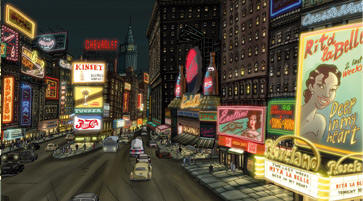 You
had previously won an Oscar for
Belle Époque.
Does that make another nomination easier to handle? Are you ready
with your speech just in case?
You
had previously won an Oscar for
Belle Époque.
Does that make another nomination easier to handle? Are you ready
with your speech just in case?
Not yet. Not
yet. But it’s true, that having been through it before makes you be
more comfortable at it. Also, being eighteen years older made
things just a bit different. (laughs)
What are your
plans for the Oscar weekend?
Well, there is
going to be a viewing party with all the friends and family here in
LA. [There will also be] another party in my home in Madrid. And
another one in Mariscol’s studio in Barcelona. So, I hope now
through Skype and that, the three parties, we will get in touch one
with each other, because there’s going to be a lot of people in
these three towns. (laughs hard)
What do you
have planned next?
I just
finished my new movie. It’s a live-action movie, my first movie in
French. It’s called The Artist and the Model [El artista y la
modelo]. It’s with Jean Rochefort, Claudia Cardinale and a
young Spanish actress, Aida Folch.
Email
us Let us know what you
think.